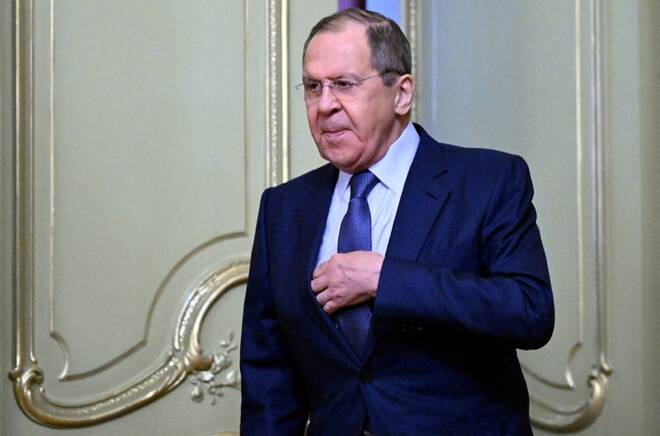Advertisement
Advertisement
Russia’s Lavrov hopes to bypass sanctions in trade with “friend” India
By:
By Krishna N. Das NEW DELHI (Reuters) - Russian Foreign Minister Sergei Lavrov began meetings with India's leaders in New Delhi on Friday after seeing his Chinese counterpart earlier in the week, as Moscow tries to keep the Asian powers on its side amid Western sanctions.
By Krishna N. Das
NEW DELHI (Reuters) -Russia will increase its use of non-Western currencies for trade with countries such as India, its foreign minister said on Friday, as he hailed New Delhi as a friend that was not taking a “one-sided view” on the Ukraine war.
Sergei Lavrov visited India to shore up support from a country Russia has long regarded as an ally a day after U.S. and British officials pressed India to avoid undermining the dollar-based financial system and sanctions imposed on Russia for its invasion of Ukraine on Feb. 24.
India and China are the only major countries that have not condemned what Russia calls its “special military operation”. After Lavrov visited China this week, Beijing said it was “more determined” to develop ties with Russia.
“We are friends,” Lavrov told a news conference after meeting his Indian counterpart, Subrahmanyam Jaishankar, adding India saw the Ukraine crisis in the “entirety of facts and not just in a one-sided way”.
Lavrov said Russia’s central bank had several years ago established a system for the communication of financial information and India had a similar system.
“It is absolutely clear that more and more transactions would be done through this system using national currencies, bypassing dollar, euro and other currencies,” he said.
Russia is the biggest supplier of defence equipment to India and Lavrov said the two countries would use a rupee-rouble mechanism to trade oil, military hardware and other goods.
“We will be ready to supply any goods which India wants to buy,” he said.
“I have no doubt that a way would be (found) to bypass the artificial impediments which illegal unilateral sanctions by the West create. This relates also to the area of military-technical cooperation.”
Lavrov said there was some movement forward in negotiations with Ukraine.
“Non-nuclear, non-bloc, neutral status – it is now being recognised as absolutely necessary,” he said.
‘CESSATION OF VIOLENCE’
Lavrov also met Indian Prime Minister Narendra Modi and briefed him on the war.
“The Prime Minister reiterated his call for an early cessation of violence, and conveyed India’s readiness to contribute in any way to the peace efforts,” India’s foreign ministry said in a statement late on Thursday.
Lavrov said Russia would be open to India mediating between Ukraine and Russia but he had not heard of any such proposal.
India has bought millions of barrels of crude oil from Russia at a discount since the war erupted, justifying the purchases as beneficial for its citizens and something that even European countries are doing.
Finance Minister Nirmala Sitharaman told CNBC-TV18 that India would continue to buy discounted oil from Russia.
“I would put my country’s national interests first and I would put my energy security first,” she said. “Why should I not buy it? I need it for my people.”
India has also contracted to buy sunflower oil from Russia at a record high price after supplies from Ukraine stopped.
Speaking on a visit to New Delhi on Thursday, U.S. Deputy National Security Adviser for International Economics Daleep Singh said Washington would not set any “red line” for India on its energy imports from Russia but did not want to see a “rapid acceleration” in purchases.
British Foreign Secretary Liz Truss also said on a visit to India on Thursday that Britain respected India’s decision to buy discounted Russian oil, while advocating stringent sanctions on Russia relating to the ports, gold and energy sectors.
(Reporting by Krishna N. Das, Devjyot Ghoshal, Alasdair Pal and Aftab Ahmed; Editing by Simon Cameron-Moore, Robert Birsel and Nick Macfie)
About the Author
Reuterscontributor
Reuters, the news and media division of Thomson Reuters, is the world’s largest international multimedia news provider reaching more than one billion people every day. Reuters provides trusted business, financial, national, and international news to professionals via Thomson Reuters desktops, the world's media organizations, and directly to consumers at Reuters.com and via Reuters TV. Learn more about Thomson Reuters products:
Did you find this article useful?
Latest news and analysis
Advertisement
